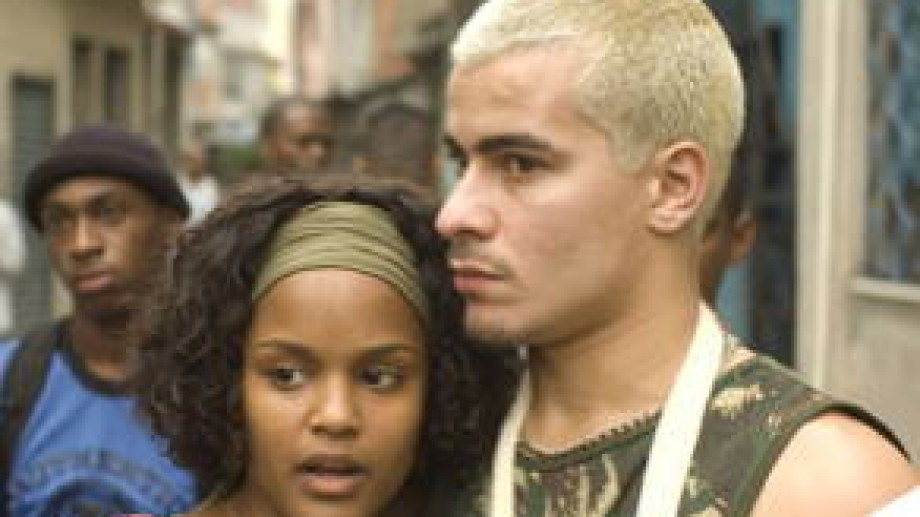
5x Favela, Now by Ourselves
Brazilian culture is so much more than soccer and Samba, and Brazilian cinema in particular has long gone tragically overlooked.
It's for this reason that we are excited to partner with ImageNation on Thursday, December 6 for a celebration of the diversity of Brazilian art, aptly titled Celebrate Brazil. This exciting event features a live performance by innovative singer-songwriter Beatriz Azevedo, a exhibition of photos and video work by Andre Cypriano, Cannon Hersey and Nefertiti Strong, and a screening of Cannes Film Festival selection 5x Favela: Now by Ourselves, which comprises five short films written, directed, and acted by promising artists from the favelas of Rio de Janeiro.
Despite the breakout success of City of God in 2002, Brazilian cinema is largely unknown to American audiences. The film—exotic, dangerous, colorful—speaks to a certain image that Brazil holds in the collective imagination, but rather than the “definitive” Brazilian film, it is merely one point of entry to the country's vast and rich filmography. For experimental cinema, try Cinema Novo, an influential new wave that arose in the 60s and 70s that included notable directors Glauber Rocha, Carlos Diegues and Nelson Pereira dos Santos. On the other end of the artistic spectrum are the B-grade chanchada softcore porn comedies that were common in the 70s.
The 80s saw the success of blockbuster Dona Flor and Her Two Husbands and Hector Babenco's chilling social drama Pixote, among others. After a national economic crisis saw Brazilian film production practically end in the early 90s due to a lack of state funding, the historical drama Carlota Joaquina, Princess of Brazil paved the way for a rapidly growing film industry led by the likes of Walter Salles and José Padilha. And don't get us started on the rich tradition of Brazilian documentaries—even harder to find outside of the country—which includes the seminal work Twenty Years Later by master filmmaker Eduardo Coutinho.

Glauber Rocha's Antonio das Mortes
So, we're curious… What's your favorite Brazlian film and why? Email us your answer at [email protected] or post it in the comments below with your name and email by Thursday, December 6 at noon for a chance to win a pair of tickets to Thursday's event! We'll announce the randomly chosen winner(s) by 2:00pm.
Congratulations to our winners! We got a ton of great responses, from Glauber Rocha's Antonio das Mortes to nailbiting documentary Bus 174 (and yes, several votes for City of God). Here are a few particular thoughtful replies we thought we'd share with you:
My favorite Brazilian film remains Glauber Rocha's Barravento, because it started me off on a journey that has still not come to an end—and never will. From the moment I saw it in graduate school, I fell in love with the Afro-Bahian culture Glauber represented. Samba de roda, capoeira, candomblé: It all became a part of me. Soon I was studying the dance and the music… and of course, visiting Salvador. It will always have a very special place in my heart. Salve, Salvador, Bahia! —Karen
The cinephile in me wants to say Black Orpheus because its such a haunting and imaginative classic but I have to go with Two Sons of Francisco because it just tugged at my heart strings like no other film. —Ramon
My favorite is Walter Salles' Central Station, a story that is simultaneously heartbreaking and inspiring, delivered by an outstanding cast! —Emily
City of God is my favorite Brazilian film as it shows the full spectrum on humanity where we're confronted by a world that is at the same time foreign and universally familiar. —Rob
Elite Squad: The Enemy Within: Extremely realistic portray of corruption, poverty and violence. It gives face and exposes political dealing and wheeling under the table in today's Brazil. Every non-Brazilian knows and is aware of samba, carnival, Rio and futebol. The majority have absolutely no clue of what's going on behind that façade. It seems like the authors of the movie did not want to take sides and be judgemental in any way. The movie doesn't try to achieve that. Instead the spectator receives in-your-face Brazilian reality without any sugar coating. The film has strong characters, many turns and twists and, most importantly, looks into the cancer that is eating the country from the inside: corruption. Flushed with natural resources, Brazil is no longer country of the future, it is the country of right now. What Brazilians and its political elites will do with this is really up to them. This movie is painfully direct and unapologetically makes the viewers aware of that. It was a pleasure to watch Wagner Moura's character and his complicated, evolving relationships with his family members as well as his professional surroundings. As a non-Brazilian, I cannot recommend this movie as depiction of modern day Brazil. I do not have that authority. As a cinema lover I can strongly encourage everyone to see this flick. Nobody should be disappointed or dissatisfied. —Dominik



